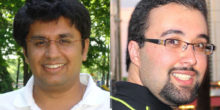 About Research Computing Colloquies
About Research Computing Colloquies
These sessions will explore how computing resources help researchers take on new and greater computational tasks, enhance research productivity, increase the competitiveness of grant submissions, and advance scientific discovery across many disciplines.
Participants will have opportunities to:
- Connect with other researchers on campus
- Participate in an ongoing campus dialogue centered on research computing
- Receive information on available resources and navigating the landscape
- Meet and engage SU’s research computing staff
For more information:
If you have questions about the Computing Colloquy sessions, send them to researchcomputing@syr.edu or Eric Sedore.
Arindam Chakraborty
Harnessing the predictive power of computational quantum chemistry: A diagrammatic, symbolic, and numerical computing perspective
Tuesday, April 18. 12:30-2:00 p.m. Katzer Collaboratory, 347 Hinds Hall.
Arindam Chakraborty, associate professor in the Department of Chemistry in the College of Arts and Sciences, will present Harnessing the predictive power of computational quantum chemistry: A diagrammatic, symbolic, and numerical computing perspective. Quantum chemistry is the application of quantum theory for understanding and predicting processes in chemical systems.
Over the past decade, computational chemistry has proven to be an indispensable tool for materials discovery. This talk will present a multifaceted perspective of the quantum chemistry for computer-aided design of novel nanomaterials in photovoltaic, photodetectors, laser sources, and nanoprobes. The presentation will focus not only on the traditional numerical computation approaches but also on the often overlooked areas of symbolic and diagrammatic computing. The future of computational quantum chemistry lies in peta- and exa- scale computing and the impact of various parallelization models (many-core, GPUs, cloud-based concurrency) will be presented.
Reza Zafarani
Human Emotions: Predictability, Patterns, and Dynamics
Reza Zafarani, assistant professor of Electrical Engineering in the College of Engineering and Computer Science, conducts research at the intersection of data mining, machine learning, social sciences, and theory. A common pattern in his research is to collect and analyze large-scale data to glean actionable patterns. He often employs theories from social sciences, psychology, and anthropology, in addition to developing and using advanced mathematical, statistical, and machine learning machinery to prove the validity of such patterns.
His talk, Human Emotions: Predictability, Patterns, and Dynamics, will present common patterns of human emotions, how those emotions evolve and how they connect with friendships, and whether emotions can be predicted. In this talk, we aim to understand how human emotions vary across users and time and how users with various emotions embed themselves in social networks. We identify emotional patterns on four different network levels, starting from users and moving up to communities. At the user level, we identify short- and long-term mood fluctuation patterns; at the community-level, we find that community members are emotionally similar and that this similarity is stronger in smaller communities. Structural properties of communities, such as their sparseness or isolation, are also connected to the emotions of their members. Our findings can help better understand the interplay between emotions and social ties.
Wednesday, April 26. 12:30-2:00 p.m. Katzer Collaboratory, 347 Hinds Hall.
